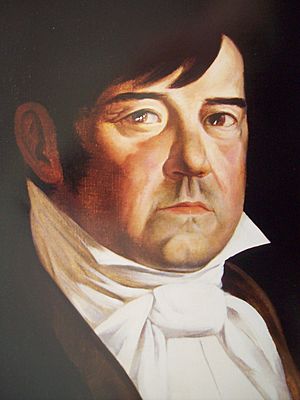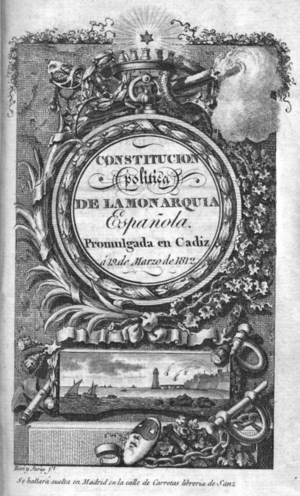Miguel Ramos Arizpe facts for kids
Quick facts for kids
Miguel Ramos Arizpe
|
|
|---|---|

Miguel Ramos Arizpe, Museo Nacional de las Intervenciones
|
|
| 17th Minister of Finance | |
| In office 5 January 1833 – 1 February 1833 |
|
| President | Manuel Gómez Pedraza |
| Preceded by | Ignacio Alas |
| Succeeded by | Valentín Gómez Farías |
| 6th Minister of Justice and Ecclesiastical Affairs | |
| In office 30 November 1825 – 7 March 1827 |
|
| President | Guadalupe Victoria |
| Preceded by | Pablo de La Llave |
| Succeeded by | Juan José Espinoza de los Monteros |
| Personal details | |
| Born | 15 February 1775 Valle de San Nicolás, New Spain |
| Died | 28 April 1843 (aged 68) Mexico City, Mexico |
| Resting place | Panteón de Dolores |
| Signature | |
Miguel Ramos Arizpe was a very important Mexican priest and politician. He was born on February 15, 1775, in Valle de San Nicolás, near Saltillo, Coahuila. He passed away on April 28, 1843, in Mexico City. People remember him as "the father of Mexican federalism." This means he helped create a system where different states or regions have their own power, rather than all power being held by one central government.
Contents
Early Life and Education
Miguel Ramos Arizpe grew up in what was then called colonial Mexico. In 1775, he was born in a region known as the Eastern Provincias Internas. He began his studies at a seminary in Monterrey. There, he learned subjects like Latin, philosophy, and moral theology.
Later, he continued his education in Guadalajara. He earned a bachelor's degree in philosophy and law. In 1803, he became a priest and returned to Monterrey. He held several church positions in that area. By 1807, he had earned a special degree called a doctorate in canon law.
Fighting for Equality and Rights
Ramos Arizpe was a strong voice for fairness. He worked in a court in Cádiz, Coahuila. He believed that people born in Europe and people born in the Americas should be treated equally. At that time, the Spanish rulers often gave more power and special treatment to those born in Spain. This was part of changes called the Bourbon reforms. Ramos Arizpe stood up against this unfair system.
The Cortes of Cádiz and the Constitution
During a time when France's Napoleon invaded Spain, the Spanish king was removed from power. This led to a special meeting called the Cortes of Cádiz. This meeting acted like a temporary government. Miguel Ramos Arizpe was chosen to represent Mexico (then called New Spain) at this important gathering.
He worked hard to protect the rights of people in the Americas. He helped create a system for provinces to have more control over their own areas, a bit like "home rule." The Cortes of Cádiz wrote the Spanish Constitution of 1812. This constitution aimed to limit the king's power and create a constitutional monarchy, where the king's power was guided by laws.
When the Spanish king, Ferdinand VII, returned to power in 1814, he got rid of the constitution. He even put many people involved in writing it, including Ramos Arizpe, in jail. Ramos Arizpe was imprisoned until 1820. In that year, a new uprising forced the king to bring back the constitution. Ramos Arizpe again became a representative. He pushed for Spain's overseas lands to have a better status, suggesting they become like a "commonwealth" with more self-governance.
Mexico's Independence and New Government
Mexico's fight for independence had been going on for many years. In 1821, Mexico finally gained its freedom from Spain. The new country needed to form its own government.
Miguel Ramos Arizpe returned to Mexico in 1822. At first, Mexico became an empire under Agustín de Iturbide. But many people were unhappy with Iturbide's rule. Ramos Arizpe played a key role in getting different regions to unite against Iturbide. He helped create the Plan of Casa Mata, which led to Iturbide's overthrow.
Writing the Mexican Constitution
After Iturbide was removed, Mexican leaders formed a new group to write a constitution. Ramos Arizpe was chosen to lead the committee that would write this important document. In a very short time, in 1824, his committee wrote the Acta Constitutiva. This was the first step in creating Mexico's founding laws. A big question at the time was how much power the different Mexican states should have. Ramos Arizpe strongly supported the idea of states having significant power, which is why he is known as the "father of Mexican federalism."
Political Career and Legacy
Miguel Ramos Arizpe served as a justice minister for several Mexican presidents. These included Guadalupe Victoria, Manuel Gómez Pedraza, Valentín Gómez Farías, and Antonio López de Santa Anna.
Today, a city in Coahuila is named after him: Ramos Arizpe. This shows how important he was to Mexico's history. In 2004, a TV documentary called El país roto, Las guerras de Miguel Ramos Arizpe was made about his life.
See also
 In Spanish: Miguel Ramos Arizpe para niños
In Spanish: Miguel Ramos Arizpe para niños
 | Aaron Henry |
 | T. R. M. Howard |
 | Jesse Jackson |


